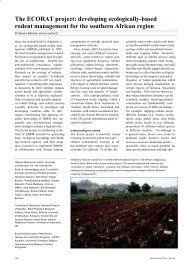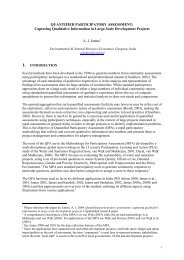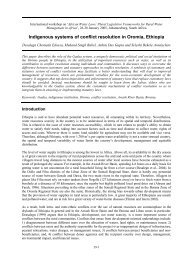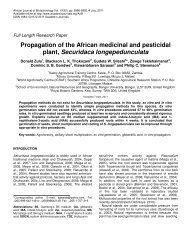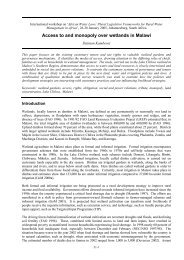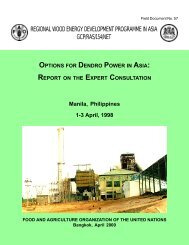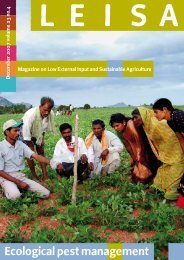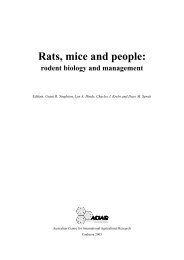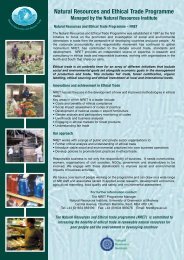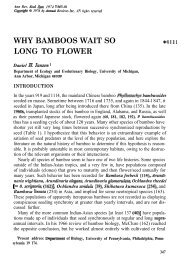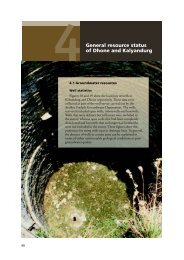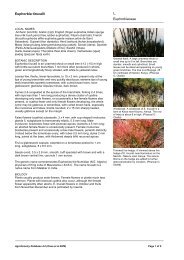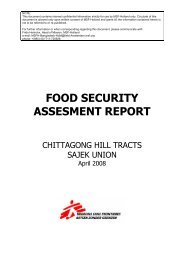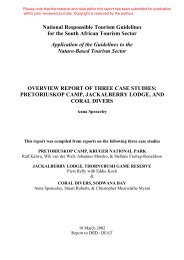Access to Rural Non-Farm Livelihoods - Natural Resources Institute
Access to Rural Non-Farm Livelihoods - Natural Resources Institute
Access to Rural Non-Farm Livelihoods - Natural Resources Institute
Create successful ePaper yourself
Turn your PDF publications into a flip-book with our unique Google optimized e-Paper software.
Lack of access <strong>to</strong> adequate transport is also a gender issue. Transport from Lwentulege south<br />
along the Kyotera road is relatively good, but expensive when compared <strong>to</strong> the incomes of<br />
the poorest, many of whom are women. Transport between Lwentulege and Kitambuza is by<br />
foot or bicycle, with loads carried on the head or wheeled on bicycles. However, very few<br />
women in the area know how <strong>to</strong> ride a bicycle 131 , let alone own one, in part due <strong>to</strong> cultural<br />
norms, in part because the area is very hilly and riding a heavy ungeared bicycle is very<br />
strenuous and difficult for most women <strong>to</strong> manage 132 . Thus women in particular are<br />
constrained <strong>to</strong> moving their produce and products on their heads, often while also carrying a<br />
baby, or <strong>to</strong> paying for transport.<br />
5.5.5 Institutional weakness<br />
There are relatively few local institutions with much impact on day <strong>to</strong> day life, and those that<br />
exist are weak or do not function as they should. Inadequate security in more remote rural<br />
areas is a constraint <strong>to</strong> continuing with businesses such as retail shops beyond a certain size,<br />
which are forced <strong>to</strong> relocate <strong>to</strong> busier trading centres, ideally with Police Posts. Prevention of<br />
theft is of paramount importance as confidence in the police’s ability <strong>to</strong> apprehend suspects<br />
and the judicial system’s ability <strong>to</strong> subsequently convict the guilty is minimal.<br />
LWF is one of few NGOs operating in the village, but some doubt has been expressed<br />
regarding its ability <strong>to</strong> reach those most in need 133 . There are no MFIs based in the village,<br />
but UGAFODE has given out some small loans in the past. However, their<br />
extension/information service seems <strong>to</strong> have been inadequate, deterring potential clients, and<br />
the selection process of recipients appears <strong>to</strong> require further refinement 134 .<br />
Box 21. Jane Reeba, would-be second-hand clothes seller<br />
Jane is 35 years old, and a widow. She cares for her own three children, as well as a nephew, the son<br />
of her late brother, selling small quantities of beans and ma<strong>to</strong>oke <strong>to</strong> generate a little income. She also helps<br />
her elderly mother-in-law, who lives in Kyaluyimuka. She would like <strong>to</strong> have a business as farming on her<br />
own is very tiring, and feels that selling second-hand clothes is something that she could manage, although<br />
caring for the children is a concern: “If the children are ill, I can not work. Perhaps if they were ill at home I<br />
could… But not if they had <strong>to</strong> be admitted…”. She would buy the s<strong>to</strong>ck in Nyendo 135 , travelling there by taxi<br />
– she used <strong>to</strong> go <strong>to</strong> Masaka often <strong>to</strong> visit relatives, as well as <strong>to</strong> take sick people <strong>to</strong> the hospital there, so<br />
knows the place well. She thinks that second-hand clothes are more profitable than new clothes, but would be<br />
prepared <strong>to</strong> adapt according <strong>to</strong> her cus<strong>to</strong>mers’ demands. She would invest the profits in repairing and<br />
improving their home, and in rearing animals for sale, and would be able <strong>to</strong> dress the family better. However,<br />
she lacks capital, and fears that all of this is “just a dream” as she has no way of getting money.<br />
Unfortunately though, without a business, there is no way she will be able <strong>to</strong> afford <strong>to</strong> send the children <strong>to</strong><br />
secondary school. She has a friend who got a loan and invested it in a new clothes business, which is going<br />
well. However there is a lot of misinformation about credit, and Jane is confused – for example, she heard<br />
from one person that if one works hard, one gets <strong>to</strong> keep the loan money, while someone else <strong>to</strong>ld her that if<br />
she <strong>to</strong>ok out a loan, the MFI would then own the business, and/or that they would come <strong>to</strong> take away her land<br />
no matter what. She is also concerned that should she get a loan members of her late husband’s family would<br />
come <strong>to</strong> “disturb” her.<br />
131 Including female extension officers, who reach nearby target communities on foot, and more distant ones<br />
only when they can get a lift with their boss on his mo<strong>to</strong>rcycle.<br />
132 In contrast <strong>to</strong> Kumi District, which is very flat, where many women ride bicycles.<br />
133 “The LCs came and made a list of all the orphans for the NGO, but then I never received any help. The<br />
Extension Worker picks the names of those who will be helped, but those names are only of her family<br />
and relatives…”<br />
Mrs Jane Reeba, a widow, who cares for her own three orphans as well as a nephew, the son of her late brother.<br />
13/10/2000. See Box 21.<br />
134 See Box 19.<br />
135 A “suburb” of Masaka, and vibrant trading centre.<br />
61



